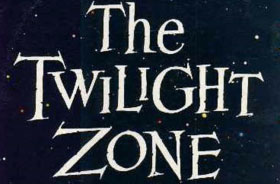Today marks the 50th anniversary of The Twilight Zone. Rod Serling’s seminal TV series with the iconic music and voice-over debuted Oct. 2, 1959, on CBS.
In the October 2009 edition of Communications Currents, NAU professor Brant Short takes us on a journey into a wondrous land whose boundaries were that of imagination as he discusses the effects that Serling and his groundbreaking TV show had on television and popular culture.
‘The Twilight Zone’ and the Power of Ideas
By Brant Short
In 1959, one of television’s most important programs debuted. Although The Twilight Zone appeared during the golden age of television, it represented a significant departure from the norms of its era, and in many ways it redefined the meanings presented by American popular culture. Through the lens of fantasy and science fiction, The Twilight Zone offered powerful messages on topics such as war, racism, addiction, extremism, violence, ageism, and consumerism.
The Twilight Zone changed the popular cultural landscape in three distinctive ways that continue to resonate in television and other forms of entertainment.
First, the show violated the rule of predictability that governed television programming in the 1950s and early 1960s. Plots, sets, costumes, and characters were highly uniform and one dimensional in television’s early decades–a trend that continues to dominate network programming. The Twilight Zone violated this uniformity, as it had no regular cast members. Additionally, episodes were often set in the past or in the future and sometimes in locations beyond earth. Some episodes suggested optimism for humanity; others dismissed the human experiment as doomed. Some episodes took a humorous look at life while others were sober and even dark. Each week brought something new and provoking.
Second, the show gave voice to people at the margins of society and questioned the rules for holding power. Corruption in both public and private life was commonplace and no group was immune to criticism. Many episodes asked viewers to consider who had power in society, whether it was being used to help or oppress others, and how society might find ways to empower those who had been shut out by virtue of wealth, gender, race, or belief. A powerful example of this message came in “The Obsolete Man” which aired in season two. Starring Burgess Meredith and Fritz Weaver, the episode examined a future society in which books were banned and librarians were sentenced to death. In the end, viewers learned about the power of the state versus the power of ideas.
Third, the show rejected placing faith in science and technology to make the world a better place. Plots often portrayed the loss of humanity when people embraced technology as a savior for human failings. Most Americans in the 1950s and 1960s accepted science and technology as unquestioned forces for making the world a better place. In contrast, The Twilight Zone asked about unintended consequences and the loss of control that people were willing to accept in the name of progress. The future was often viewed as a bleak place because of human mistakes, greed, and conceit.
The power of television to help viewers confront, and not simply escape, the problems of contemporary life continues to be a rare commodity in today’s television landscape. At its core, The Twilight Zone was more about ideas than commerce. Creator and writer Rod Serling used the show as an electronic town hall which asked viewers questions about their beliefs in morality, ethics, power, and humanity. That is why people continue to watch reruns of episodes they have seen time and again.
The best television programming of the last fifty years has followed The Twilight Zone’s notion that viewers should be treated as serious consumers of ideas, not disconnected individuals attracted to the novelty of visual images. Thoughtful observers understand that Star Trek was not a show about space travel in the future, that All in the Family was not about a cranky father living in New York City, or that Northern Exposure was not about an urban doctor trapped in the Alaskan wilderness. These programs and others followed The Twilight Zone’s penchant for asking deep questions about values, technology, relationships, and, ultimately, the future of humanity. Watch an episode of The Twilight Zone — you too will be asked to think critically about your own life and how you communicate with others in a complicated and challenging worl



